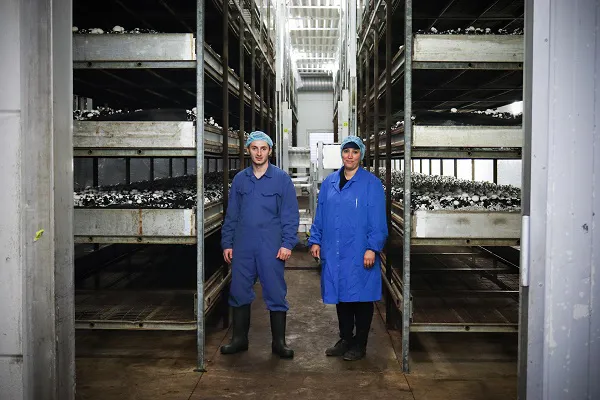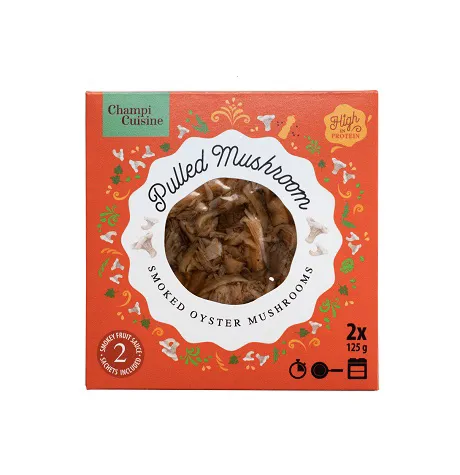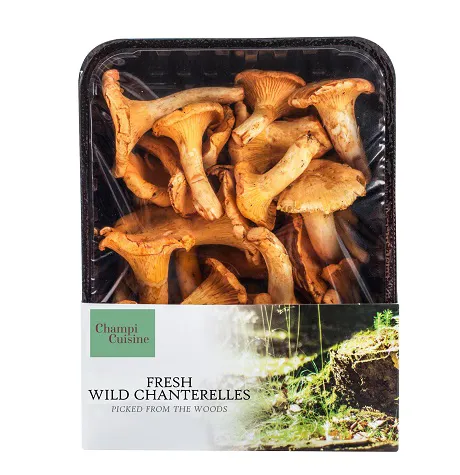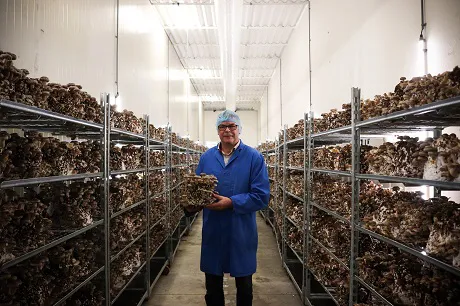Lately, many Europeans have drastically changed their diets. There’s been a switch to healthier food and less meat. But, sustainability, local products, and e-commerce also contribute to this changing market. Mushrooms can benefit from this, say Jurgen and Rob Banken of the Dutch company, Banken Champignons.

Employees Samira and Robbert in the mushroom cell
“Admit it, vertical farming started with mushroom growers, right? It lends itself perfectly to urban farming. After all, it’s a fungal culture that can easily be housed in an urban environment.” Fungi have another characteristic that differs from other fruit and vegetables. They may contain vitamin D.
That, however, requires farmers to make some changes. Mushrooms do naturally have this nutrient; it just has to be ‘activated’. “So, we grow our mushrooms under lights, which activates a substance called ergosterol. We’re one of the few companies that have received approval for this from the European Food Safety Authority,” say Jurgen and Rob.

Meat replacer
People get most of their protein from animal products. “But mushrooms are a good, plant-based protein source. They’re ideal meat replacers in the so-called protein transition. That’s what the changing diet, with less meat and more fruit and vegetables, is called. Until a few years ago, vegetarians and, especially, vegans were singled out. That’s changing and flexitarians are now emerging too. Mushrooms, as meat replacers, offer an advantage. You don’t always have to make a patty from them. In patties, the meat replacers are first minced finely and then formed into a burger patty."

"Mushrooms, like the portobello, on the other hand, can be presented as a meat replacer, while retaining its fleshy structure.” But, that’s not Banken Champignons’ latest product. “We want to introduce pulled mushrooms to the market soon. The better-known pulled jackfruit inspired it. These are plant-based alternatives for pulled pork. A second plant-based meat replacer adds variety to that specific assortment. It, after all, tastes different from jackfruit. We're also busy developing portobello pizza bases,” the men explain.

Higher mushroom prices, but not yet high enough
These changing consumption trends affect the assortment. “My father began growing only white mushrooms in cells many years ago. Now, that variety’s market share is stagnating or even declining. There’s an increased focus on chestnut and other cultivated mushrooms, as well as wild mushrooms. These include varieties like oyster and shiitake mushrooms. Chanterelles, for example, are currently doing very well."

"Not only in the hospitality and foodservice sectors. You increasingly find them in supermarkets. We now sell these wild mushrooms from June to October. And there’s a rising demand for more varieties. This increased demand is, however, somewhat at odds with the local aspect. That’s because the closest ‘production countries’ (to the Netherlands) are in Eastern Europe - Poland, the Baltic States, Belarus, and Russia.” Rob and Jurgen continue.
The Banken brothers have seen market prices increase this year again. That’s after they dropped for years. “Production is also falling further, while demand is rising. We, therefore, expect this market development to continue. When Banken began, there were, after all, only a handful of Dutch mushroom nurseries. By the end of the 90s, there were more than a thousand," says Rob.
"Things started going wrong then. Twenty years later, and we’re at 100 growers. That number will keep decreasing as farmers age. Then production availability becomes an issue. But, these still aren’t prices that mushroom growers should be earning. We can only compensate for that with niche and value-added products. I don’t believe in quality labels. Mushrooms remain a bulk product that supermarkets often sell under private labels."

Employee Henk in shiitake cell
Laborers and raw materials
Besides the price, Rob and Jurgen think there will be two more major challenges for mushroom cultivation in the years to come - enough available workers and the availability of raw materials. “Good harvesters are hard to find. Robotization could be an alternative, and we’re already doing a few test runs. But, these machines aren't yet at the human selection level."
"The second challenge is perhaps even greater. The natural substances we use - horse and chicken manure and, especially, straw - are, of course, very weather-bound. So, our sector also has to deal with climate extremes. There's still no workable alternative for these raw materials. So, more research is needed,” the brothers conclude.
Rob Banken
r.banken@bankenchampignons.com
Jurgen Banken
j.banken@bankenchampignons.com
 Banken Champignons
Banken Champignons
Tel: +31 24 3667 444
sales@bankenchampignons.com
www.bankenchampignons.com
